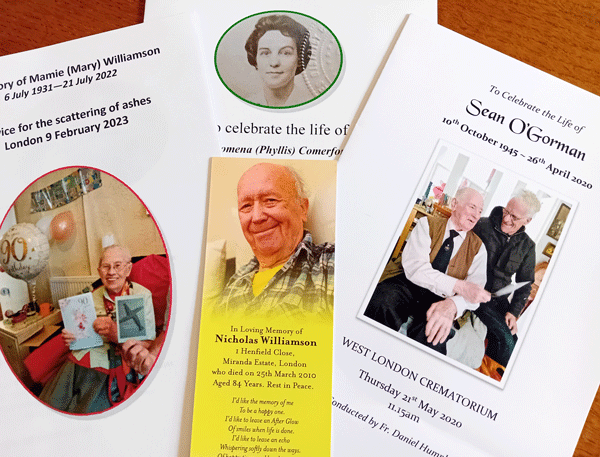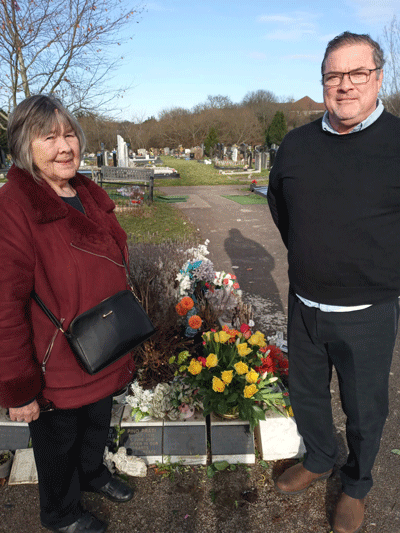Irish Chaplaincy Seniors
End of Life Care
What it is
End of life care is a central element of the support the Irish Chaplaincy provides to Seniors. We have the great privilege of being asked by people to journey with them in the final years, months and weeks of their lives. It is a process that is multi-faceted, covering a range of emotional, spiritual and practical issues and considerations.
For example, will making and funeral planning, transition into a care setting, worries and concerns about getting frail and the process of dying and questions about the meaning of life and what lies beyond death.
Yet even these are not clear and neat divisions of what is involved and there is often a complex interplay going on between all three at the same time.
In other words, none of these issues can be seen in isolation and it is crucial to take a holistic approach when supporting people in these matters.
Concerns and fears about dying or life after death may well affect a person’s willingness to plan for their funeral or organise a will. This can further be complicated by financial worries and fractured relationships with family or friends.
What we can offer
In our experience central to supporting people with this process is for a person to have a contact from an agency or organisation, who acts as the conduit or key player in managing these different elements of support they need. Time and again we have found that people need a trusted individual who can introduce and facilitate the involvement of legal advice, funeral planning, as well as emotional, counselling and spiritual support.
At the Irish Chaplaincy we act as this link, as well as directly delivering several elements ourselves, something which we are uniquely placed to do given the holistic approach to our work.

This role is crucial so people don’t feel overwhelmed and also have a regular source of support from someone who has an overview of the different elements of guidance they need. In other words, someone who can help them in navigating the often-challenging emotions and decisions that this process will inevitably produce.
We are also mindful that for many of our seniors there may be a conflicted or complicated relationship with Ireland, possibly relating to early childhood traumatic experiences or shame related issues. Our response has been to be present to each senior’s individual story and offer them unconditional positive empathy to facilitate their end-of-life care journey.
When one of our clients has no next of kin, or have family and friends who are far away or unable to engage, we are regularly required to act as intermediaries and advocates in all aspects of end of life accompaniment.

One client Mary, was visited by us in hospital where we liaised with the medical teams about her care, as well as regarding her cultural needs (she was in a coma and Irish songs and hymns were played to her on our advice).
Previously we had arranged for a solicitor to visit Mary at home to make her will, and were present to make introductions as we knew and trusted the solicitor involved and Mary trusted us.
We also provided updates and liaison with her family in Ireland when she was in hospital.
On her death, as her family were unable to, we arranged all aspects of Mary’s funeral. Finally, we organised the internment of her ashes with those of her late husband here in London and led the internment service.
We remain in contact with Mary’s family as they value the contact especially at significant times such at remembrance time in November, Mary’s birthday and at Christmas.
Bereavement support and ongoing contact with family and friends
End of life care may also include bereavement care, supporting family and friends of a Senior, who in some cases may have not seen their relative for many years. Part of this bereavement support is helping family “fill in the gaps” about the person who has died and sharing sensitively our memories of them. This enables development in the grieving process and a continuation of the holistic service that we provide.
Relationship with a person’s family and friends after their death is crucial and should be part of end-of-life care, ensuring people are remembered and not forgotten, as well as bringing comfort to their friends and family, if they have them.
We remain in contact with many families and friends of our clients here and in Ireland, who have died over the years and who say this remembrance and contact from us is very important to them. Some are even able to attend our annual Chaplaincy Remembrance Service in London, which is extremely meaningful for them.
Wills
We know, encouragement is very much needed within the Irish community when it comes to making a will. The thought of doing this can be stressful for many, as there are cost implications and questions about executors and inheritance too.
Making a will is clearly a wise idea whatever a person’s circumstances as it prevents a lot of complications if people die without one. In our experience it is a very long-drawn-out affair to try and sort out a person’s estate when they have left no will.
We are sometimes in the position when we are asked to do this by Government agencies in the UK which can be very complex.
Lasting Power of Attorney
Setting up a lasting power of attorney (LPA) for heath and financial issues is also important for people to consider, but there are again cost implications (though you can complete it online relatively cheaply without a solicitor).
However, people may have no obvious person or persons to be their attorney, even if they want to draw up an LPA.
Funeral Planning
Encouraging funeral planning is important too, especially if people want to be buried back in Ireland. There are significant cost implications too which concern people and this needs to be thought through carefully. We have experience of this and have ensured wherever possible that people’s final wishes are met, including repatriation to Ireland.
We have seen the importance of recognising culturally sensitive elements and being present at the time of a funeral too. This could include having prayers and hymns said or sung in Irish and linking in with specific places in Ireland where the deceased is from. We have found that paying particular attention to these nuances of an Irish person’s life is valued by the mourners and highlights an important link with home.
We are conscious too that for some people they may wish to delve deeper into the religious aspects of end-of-life care and for other people they do not wish to have a religious ceremony for their funeral. Our core belief is to respect the spirituality of every person, and we accompany them respecting their individual wishes.
There are many more people who would benefit from our services if we had the resources. We’d be grateful for any help you can offer either by becoming a volunteer or by donating.
You can also get the latest updates from our case workers and volunteers by joining our email list.
VolunteerDonate NowSign up for Email Updates and News